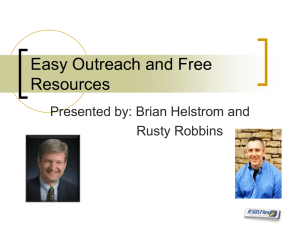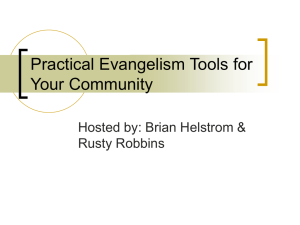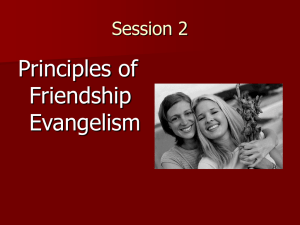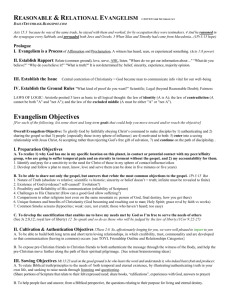Christian mission - The Methodist Church of Great Britain
advertisement
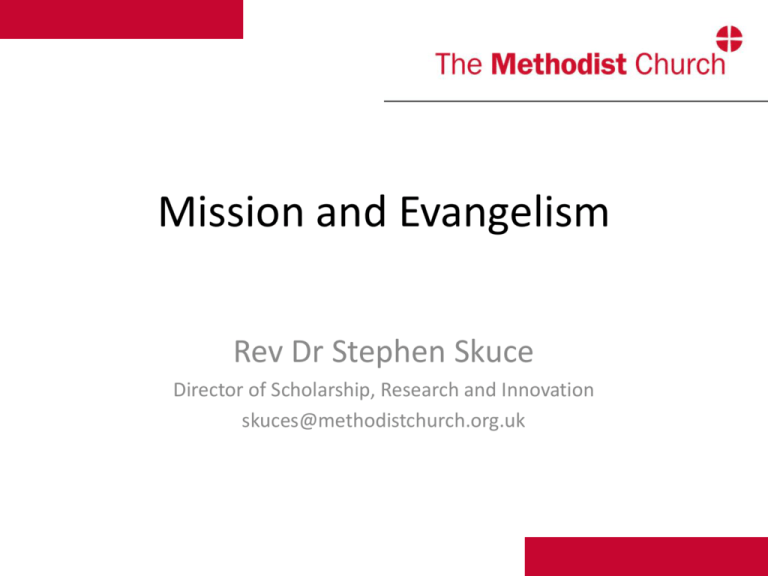
Mission and Evangelism Rev Dr Stephen Skuce Director of Scholarship, Research and Innovation skuces@methodistchurch.org.uk ‘One Mission’ Britain – wherever: it’s the same Eg 2014 Report of the One Mission Working Party (3:2) (Some Americans still talk about ‘missions’) Aspects of Evangelism: Summary of the Evangelism Commission ‘People were not always clear regarding what they were talking about. The language can get quite muddled between evangelism and mission – and the distinction is negligible from a congregation’s perspective.’ In the rest of the ‘Aspects of Evangelism’ resource, I think the words ‘evangelism’ and ‘mission’ are used interchangeably. I suggest a sharper understanding of mission and evangelism would help. It is abundantly clear that there is a challenge at the very heart of what evangelism is. From the organisations that strongly believe in proclamation as the only form of evangelisation, to those who see evangelism as much more developmental in its nature, involving both presence and proclamation, the world of evangelism in the UK is wide and broad. Evangelical Alliance UK Evangelism Review, March 2005: Part of the confusion is around mission. It might be helpful to make a distinction between two uses of mission: 1 A theological concept that seeks to describe the action of God with the world: missio Dei 2 A Christian response to this whereby Christians engage in a wide variety of activities with those who are not followers of Jesus: Christian mission A further issue is that Christian mission includes evangelism which can perhaps be helpfully considered as a subset of practices. But, evangelism does not include all that is in Christian mission. Consequently, if the two terms are used interchangeably, there can be confusion. 2012 Conference Future Mission Together 4.2 Before we proceed, it is important to define what is meant, in this report, by the word mission. There is often confusion about what is mission and what is evangelism. Mission and evangelism are closely linked, but different. The following definitions, taken from the WCC statement on Mission and Evangelism in Unity (2000) makes the distinction more clear: Mission: carries a holistic understanding – the proclamation and sharing of the good news of the gospel in the word, deed, prayer and worship and the everyday witness of the Christian life. Evangelism: while not excluding the different dimensions of mission, focuses on explicit and intentional voicing of the gospel, including the invitation to personal conversion to a new life in Christ and to discipleship. 4.3 Mission and evangelism are thus closely linked and in many ways the word mission includes and implies evangelism. It is in this way that the word mission is used in this report. See also 4.4-6.2 2013 Conference Report of the MMS Working Party 6.1 ‘… should mean that mission and evangelism can be viewed holistically with less division between them …’ Does this reintroduce a conflation of the terms? Cf 6.3 Mission: ‘Mission begins in the heart of the Triune God and the love which binds together the Holy trinity overflows to all humanity and creation.’ Christian Mission: ‘God invites us into the life-giving mission of the Triune God and empowers us to bear witness to the vision of abundant life for all in the new heaven and earth.’ Evangelism: ‘Evangelism is a confident but humble sharing of our faith and conviction with other people. Such sharing is a gift to others which announces the love, grace and mercy of God in Christ. It is the inevitable fruit of genuine faith.’ WCC Together Towards Life (2013/14) What is Mission? Evangelism? Neither? The calling of the Methodist Church is: • To increase awareness of God's presence and to celebrate God's love. • To help people to grow and learn as Christians, through mutual support and care. • To be a good neighbour to people in need and to challenge injustice. • To make more followers of Jesus Christ. Which is Christian mission? Which is evangelism? 1. How do we develop friendly attitudes towards everyone we meet? 2. Do we have a clear message? Are the words we use straightforward and meaningful to those outside the Church? 3. What attracts others to the Christian faith? Are there initiatives we could take to present our convictions? Can we do this with Christians of other denominations? Where should the focus be on church premises, or in the community? 4. How can we learn about effective witness from Christians in other cultures? 5. What can we do to make our premises more welcoming? 6. Should we consider planting a new congregation in this locality? http://www.methodist.org.uk/who-we-are/vision-values Evangelism ‘Mission was understood as being derived from the very nature of God. It was thus put in the context of the doctrine of the Trinity, not of ecclesiology or soteriology. The classical doctrine of the missio Dei as God the Father sending the Son, and God the Father and the Son sending the Spirit was expanded to include yet another "movement": Father, Son, and Holy Spirit sending the church into the world.’ David Bosch, Transforming Mission, p.390 Mission … considering the church, not so much its inner life (ad intra) but in its activities outside (ad extra). … concerns the church’s evangelistic, prophetic and diaconal ministries within the everyday life of human communities. J Andrew Kirk, The Church and the World, p. xiii E Stanley Jones: ‘Evangelism is the Good News of the Kingdom of God on earth; that Kingdom personalised and embodied in Christ’ DT Niles : ‘One beggar telling another beggar where to find bread’. Proclamation, church growth, conversion, testimony and discipleship are part of evangelism but inadequate characterisations of the whole. ‘We can best improve our thinking on evangelism by conceiving it as that set of intentional activities which is governed by the goal of initiating people into the kingdom of God for the first time.’ Abraham The Logic of Evangelism, p95 Does evangelism involve initiation? For Abraham initiation involves: 1. something beyond the formal admittance into a Christian body 2. distinct from conversion 3. can’t be reduced to intellectual assent to a creed 4. can’t be reduced to a changed moral understanding 5. isn’t tied to certain rites or ceremonies 6. isn’t limited to a positive social activism Abraham considers four agents involved in evangelism: 1. 2. 3. 4. the triune God the Church the evangelist those being evangelised ‘… we can best improve our thinking on evangelism by construing it as that set of loving, intentional activities governed by the goal of initiating persons into Christian discipleship in response to the reign of God.’ Jones, The Evangelistic Love of God and Neighbour, p.114 Scott Jones: Components of Evangelism 1. a divine activity and a human activity 2. both initiation and the expectation of results 3. aimed at personal decisions but involve whole communities 4. be a distinct ministry yet be integrated into wider Christian discipleship 5. considered theologically yet continually reexamined contextually 6. never understood in opposition to social justice ‘Evangelism is our sharing and inviting others to experience the good news that God loves us and invites us into a transforming relationship through which we are forgiven, receive new life, and are restored to the image of God, which is love.’ Knight & Powe Transforming Evangelism, p.17 ‘Evangelism rightly understood is the holistic initiation of people into the reign of God as revealed in Jesus Christ.’ Elaine Heath The Mystic Way of Evangelism, p.13 Today, British Methodists are reasonably good at Christian mission, but very weak at evangelism. If we make clear that mission is engaging with those outside of the Christian faith, but that in itself is not evangelism, it might assist us to recognise where we need to learn more. Bibliography Abraham, W The Logic of Evangelism (Grand Rapids: Eerdmans, 1989) Chilcote & WarnerThe Study of Evangelism: Exploring a Missional Practice of the Church (Cambridge: Eerdmans, 2008) Gunter & Robinson Considering the Great Commission: Evangelism and Mission in the Wesleyan Spirit (Nashville: Abingdon, 2005) Heath, E The Mystic Way of Evangelism (Grand Rapids: Baker, 2008) Jones, S The Evangelistic Love of God and Neighbor (Nashville: Abingdon, 2003) Kirk, JA The Church and the World (Milton Keynes: Paternoster, 2014) Kleiber, W Call and Response: Biblical Foundations for a Theology of Evangelism (Nashville: Abingdon, 1997) Knight & Powe Transforming Evangelism: The Wesleyan Way of Sharing Faith (Nashville: Discipleship, 2006) Logan, J (ed) Christ for the World (Nashville, Abingdon, 1996) Short & Kiser Reclaiming the Wesleyan Social Witness: Offering Christ (Franklin: Providence House, 2008) Stone, B Evangelism after Christendom (Grand Rapids: Brazos, 2007) Tuttle, R The Story of Evangelism: A History of the Witness to the Gospel (Nashville: Abingdon, 2006) Whiteman & Anderson World Mission in the Wesleyan Spirit (Franklin: Providence House, 2009)
